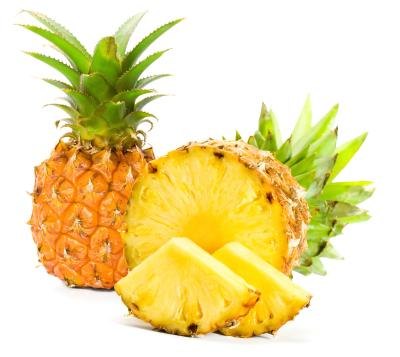Pineapple is a highly versatile fruit that you can enjoy as a dessert or a pick-me-up, include in salads, main courses and cakes or use as a garnish for meats and vegetables. It's available fresh year-round and is sold canned, frozen, candied and juiced. Pineapple is good for you, because it supplies a significant amount of vitamin C, potassium and manganese. The golden-yellow fruit also is free of fat and low in sodium. It is a source of fiber and also contains an enzyme associated with healing and preventing certain major maladies.

Vitamins and Key Minerals
While many people associate vitamin C with oranges, pineapples offer almost as much in an equivalent serving. One cup of pineapple chunks has 78.9 mg of vitamin C, compared with 87.7 mg in a typical navel orange. The same size serving of pineapple also supplies 180 mg of potassium, which will help get you toward the Institute of Medicine's recommended intake of 4.7 g a day. Pineapples are particularly high in manganese, with 1.53 mg in a cup of chunks. The Institute of Medicine recommends between 1.6 and 2.3 mg a day, depending on age and gender. The body needs manganese for normal growth. The mineral also helps to break down fats, carbohydrates and proteins.
Fat and Sodium
Pineapples are naturally fat-free and low in sodium. One cup of pineapple chunks contains 2 mg of sodium, which is negligible. The USDA urges Americans to consume less than 2,300 mg of sodium a day, and the American Heart Association says those with high blood pressure or other heart-related ailments should restrict their intake to less than 1,500 mg a day.
Bromelain
Fresh pineapples are the sole source of bromelain, a combination of protein-digesting enzymes that fight inflammation in the body. Bromelain is "particularly effective in reducing inflammation associated with infection and injuries," according to the University of Maryland Medical Center. Experts there note that researchers have seen indications that bromelain might help treat wounds and burns, sinus inflammation, indigestion, arthritis, asthma and infection. However, much of this research has been in animals. The University of Maryland notes that the level of bromelain in a pineapple is not sufficient to have a medicinal effect. Talk with your physician before taking bromelain or any other supplement.
Warnings
Don't use fresh or frozen pineapple in gelatin mixtures because a natural enzyme prevents them from setting. Canned pineapple won't cause the problem. If you haven't eaten pineapple before, be aware that a small number of people suffer an allergic reaction to the fruit. You may experience hives, itching, swelling or eczema. Wheezing, nasal congestion or trouble breathing, as well as lightheadedness, dizziness or fainting, are also possible. If the conditions become extreme, or if you have difficulty swallowing or breathing, a rapid pulse, loss of consciousness or a blue color in the skin and nails, seek emergency medical care.
www.livestrong.com





No comments:
Post a Comment